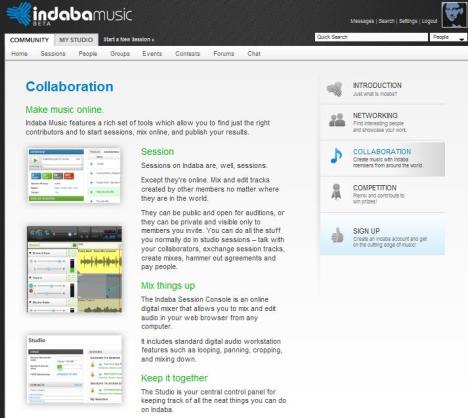Listening to NPR a few weeks back, I caught a quick rundown they did of Indaba on “The Beat.” I just recently had time to start digging into the site, and I have to say that it is definitely in the upper echelon of what is considered extended learning for our students.
Indaba helps students take part in a learning process that repeatedly goes overlooked in our schools: music. When I started teaching, I made it a point to fit music into my class anywhere I could, while also sticking to the core standards (math, language arts, science, and social studies). It started out benign enough with using baroque during writing sessions, evolved into using music as auditory transition cues, and even manifested into a Music Appreciation end-of-the-year project where students compared historical and thematic elements of The Beatles, Nirvana, Neil Young, and Gorillaz.
Eventually, my students were asking to make music. I constructed for them a very basic, yet highly foundational, activity (thanks to Christine Mayfield from California State University, Fullerton) where they manipulated circles on a Tic-Tac-Toe styled floormat, and then clapped out the beats. They experimented with altering the beats and rests, adjusting start times, and even playing with time signatures. While this may seem a great addition to the Big Four that we teach, it really was an amateurish attempt at teaching music. It was truly no better than having my students trace letters on cursive worksheets, and calling that authoring.
Indaba takes a sledgehammer to every roadblock that’s in the way of our students wanting to make music, and have it be heard by millions. First, students sign-up (for free) and list their influences and any instruments they may know how to play. Then, Indaba attempts to match them with one of millions of users on the site. Once users are matched (teachers can create private accounts for students so that only classmates can see/talk with each other), they can start a session. This session is a browser-based mixing board that allows all users in the session to record music in real-time and to mix it instantly.

When they’re finished, they have a product in MP3 format, a network of millions of users (including recording company execs), and a system of feedback whereby students can adjust their techniques and hone their skills.
The true power of Indaba comes in its ability to allow users to upload separate tracks and remix on-line. Remixing does to music in the 21st century what the electric guitar did in the 20th: allowed a vastly larger group of musicians have an outlet through which to stream their musical creativity.
Students are going to be far more interested in the remixing component, and less in the true, absolute creation. And, why wouldn’t they? They’re now working in a networking age where there’s really no, true creation, only fine tuning and editing. Students are used to visiting a Wiki and making edits to an already finished product. They’re flexing their editing muscles more than their constructing muscles in writing, and the same holds true for music. We spent so many years teaching them how to reinvent the wheel over and over again with their writing, and never stopped to show them what to do when that wheel finally buckles, and needs repair. Indaba, and networking sites in general, have stepped up to fill-in that gap of collaboration.
To see a real-life sign of where the world is going with collaboration, you need to look no further than Top 40 artists. Last year, Radiohead launched a new site, RadioheadRemix.com, which encourages users to download separate tracks of songs they post, remix them, and upload them back to create a community of remixes.
Just this past month, UK artist Lily Allen released her new album, “It’s Not Me, It’s You,” which comes packed with separate tracks of every song on the CD: completely DRM-free, and completely Creative Commons allowance. She too, like Radiohead, launched a repository for all these remixes.
Even Stephen Colbert challenged his audience last month to remix his interviews. The contest resulted in thousands of uploads, each with its own style as unique as a fingerprint. That is truly “meta.”

It only makes sense, then, that a site such as Indaba takes the great ideas of a few well-known artists, and boils it down for an entire community of musicians and learners. Having access to pure tracks will become commonplace to our students. It is a career opportunity waiting for them to grasp. For the child who has trouble with reading comprehension, or the child has has difficulty constructing a 5 paragraph essay, this could be their outlet.
We know that student who had reading difficulties in the 90’s became the sought-after programmer of the 2000’s. Who will Indaba create in our students?
Filed under: Uncategorized | Tagged: colbert, creativecommons, indaba, lilyallen, networking, radiohead, remix | Leave a comment »


